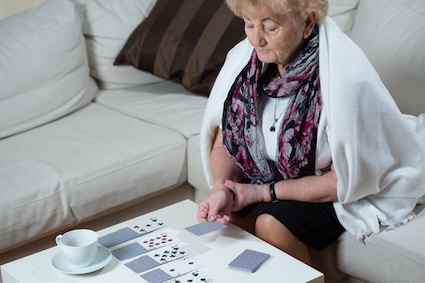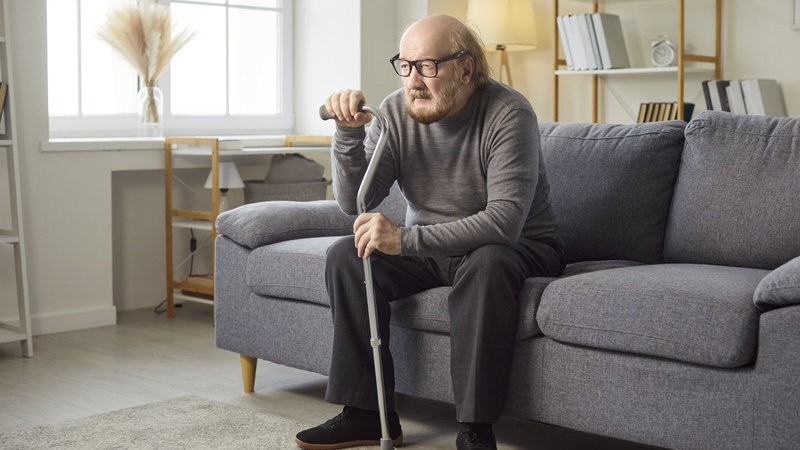Urinary tract issues can push people into isolation, creating an incontinence and loneliness link – causing even greater mental and physical health issues. Seniors Guide writer Kari Smith explains.
Nearly one in three American adults say they feel isolated, reports the American Psychiatric Association, a number that has risen sharply in recent years. While factors such as technology, family structure, or the pandemic have contributed, there is another driver affecting many seniors: urinary incontinence (UI).
Since there is a social stigma around urinary tract issues, including discussion of the problems, the experience can chip away at a person’s social connections and sense of community and belonging. When bladder problems push people into isolation, the ripple effects on health are profound, because loneliness doesn’t just affect emotions – it increases risks of heart disease, diabetes, and early mortality.
“Incontinence threatens identity and dignity, and it acts as a driver of loneliness,” says Aleece Fosnight, a medical advisor and urology specialist at Aeroflow Urology. It is one of the main reasons people don’t seek treatment, she says, even though good options exist.
Explaining the incontinence and loneliness link
For people living with incontinence, the fear of an accident in public can be enough to skip lunch with friends, avoid long drives, or stop going to community gatherings. That retreat from daily life quickly turns into loneliness, with devastating consequences. Research has linked urinary incontinence with higher rates of depression, anxiety, and even dementia. A 2017 study of nearly 7,000 older adults in Ireland found a direct connection between bladder symptoms and loneliness. A more recent 2024 BMC Women’s Health meta-study also ties urinary incontinence to depression.
“Incontinence doesn’t just affect the bladder, it affects the whole person,” Fosnight explains. “The fear of accidents, odor, or social embarrassment often leads to isolation, which increases the risk of depression and anxiety. For those with cognitive decline like Alzheimer’s or dementia, incontinence can worsen confusion, agitation, and caregiver stress.”
Another misconception is that treatment only becomes necessary once symptoms are severe. Early intervention can make all the difference – helping people stay active and socially connected. Treating incontinence early and directly has been shown to improve mental health, independence, and overall quality of life.
Starting the conversation
 An estimated 25 million Americans live with urinary incontinence, but despite its prevalence, many sufferers remain silent. Recent studies suggest only around 30% to 40% of women with symptoms seek help, while estimates for men are even lower.
An estimated 25 million Americans live with urinary incontinence, but despite its prevalence, many sufferers remain silent. Recent studies suggest only around 30% to 40% of women with symptoms seek help, while estimates for men are even lower.
Why? Many believe it is simply a normal part of life, or that nothing can be done beyond using pads and briefs. In reality, there are behavioral strategies, pelvic floor therapies, lifestyle changes, medications, and even minimally invasive procedures that can dramatically reduce symptoms.
For older adults especially, raising the topic with a medical provider can feel intimidating. Fosnight suggests beginning with simple, practical steps:
- Keep a bladder diary. Note when leaks occur, what fluids were consumed, and how symptoms affect daily life.
- Bring up your concerns in a routine visit. “You don’t have to make a special visit,” she says. “Just use a simple statement like, ‘I’ve noticed bladder leakage and want to know my options’.”
- Uncomfortable talking face to face? Use your electronic patient portal to communicate with your medical professional.
- As with any other health condition, if your provider dismisses you, seek someone who will listen and validate your concerns.
Related: Lifestyle Changes for Urinary Incontinence Help Delay or Prevent Surgery
Cost and coverage
Financial concerns keep many from seeking care. Medicare and private insurance often cover evaluation, therapy, medications, and some procedures, but disposable pads and briefs are not always covered. State Medicaid programs and VA benefits may fill some of those gaps.
“Always ask about what your plan covers, what prior authorizations are needed, and make sure your provider documents your incontinence needs as ‘medically necessary’,” Fosnight advises. Specialized companies like Aeroflow Urology, she says, can sometimes help patients navigate coverage and secure supplies by working with a patient’s insurance company for the best outcome.
Lifestyle changes that help
Alongside medical treatment, Fosnight recommends simple changes:
- Cut back on bladder irritants such as caffeine, alcohol, carbonated drinks, and spicy or citrus foods.
- Stay active and move your body.
- Schedule regular bathroom trips (timed voiding) every couple of hours to avoid urgency.
- Hydrate steadily throughout the day rather than drinking large amounts at once.
- Research modern incontinence products, which are a discreet option for maintaining confidence while pursuing longer-term solutions.
- If possible, work with a pelvic floor therapist.
Supporting loved ones
Family and caregivers can either reinforce the stigma, exacerbating the incontinence and loneliness link, or help restore dignity for their loved one. “Approach the conversation with empathy,” Fosnight says. “Something as simple as, ‘I know this is difficult to talk about, but I want you to feel supported’ makes a difference.”
Encouraging independence is key, whether that means offering adaptive clothing, helping track symptoms, or planning outings together. Above all, she says, talk with your loved one, not at them, and aim to support them, rather than taking over.
Looking forward
Innovations in treatment are also changing the landscape to minimize the incontinence and loneliness link. Newer Beta3-agonist medications such as mirabegron and vibegron have fewer side effects than older drugs. Minimally invasive therapies like nerve stimulation or targeted Botox injections are expanding options. Even telehealth pelvic floor therapy and digital training apps are making access easier, especially for those with mobility issues.
Fosnight’s message to those feeling alone is simple: “You are not alone. Millions of people of all ages experience urinary leakage, and you do not have to live in silence.”
As seniors struggle with loneliness, incontinence deserves a place in the conversation. Addressing it openly and without shame could be one of the most powerful ways to protect both mental and physical health, restoring not just bladder control, but confidence, connection, and dignity.





